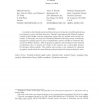Free Online Productivity Tools
i2Speak
i2Symbol
i2OCR
iTex2Img
iWeb2Print
iWeb2Shot
i2Type
iPdf2Split
iPdf2Merge
i2Bopomofo
i2Arabic
i2Style
i2Image
i2PDF
iLatex2Rtf
Sci2ools
119
click to vote
TIT
2010
2010
Tunstall code, Khodak variations, and random walks
A variable-to-fixed length encoder partitions the source string into variable-length phrases that belong to a given and fixed dictionary. Tunstall, and independently Khodak, designed variable-to-fixed length codes for memoryless sources that are optimal under certain constraints. In this paper, we study the Tunstall and Khodak codes using variety of techniques ranging from stopping times for sums of independent random variables to Tauberian theorems and Mellin transform. After proposing an algebraic characterization of the Tunstall and Khodak codes, we present new results on the variance and a central limit theorem for dictionary phrase lengths. This analysis also provides a new argument for obtaining asymptotic results about the mean dictionary phrase length and average redundancy rates.
| Added | 22 May 2011 |
| Updated | 22 May 2011 |
| Type | Journal |
| Year | 2010 |
| Where | TIT |
| Authors | Michael Drmota, Yuriy A. Reznik, Wojciech Szpankowski |
Comments (0)

